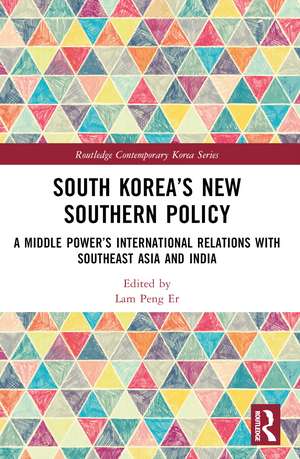South Korea’s New Southern Policy: A Middle Power’s International Relations with Southeast Asia and India: Routledge Contemporary Korea Series
Editat de Lam Peng Eren Limba Engleză Paperback – 7 oct 2024
| Toate formatele și edițiile | Preț | Express |
|---|---|---|
| Paperback (1) | 272.07 lei 6-8 săpt. | |
| Taylor & Francis – 7 oct 2024 | 272.07 lei 6-8 săpt. | |
| Hardback (1) | 872.85 lei 6-8 săpt. | +47.84 lei 6-10 zile |
| Taylor & Francis – 17 apr 2023 | 872.85 lei 6-8 săpt. | +47.84 lei 6-10 zile |
Preț: 272.07 lei
Preț vechi: 326.49 lei
-17% Nou
Puncte Express: 408
Preț estimativ în valută:
52.09€ • 54.14$ • 43.18£
52.09€ • 54.14$ • 43.18£
Carte tipărită la comandă
Livrare economică 05-19 februarie 25
Preluare comenzi: 021 569.72.76
Specificații
ISBN-13: 9781032404486
ISBN-10: 1032404485
Pagini: 258
Ilustrații: 20
Dimensiuni: 156 x 234 mm
Greutate: 0.45 kg
Ediția:1
Editura: Taylor & Francis
Colecția Routledge
Seria Routledge Contemporary Korea Series
Locul publicării:Oxford, United Kingdom
ISBN-10: 1032404485
Pagini: 258
Ilustrații: 20
Dimensiuni: 156 x 234 mm
Greutate: 0.45 kg
Ediția:1
Editura: Taylor & Francis
Colecția Routledge
Seria Routledge Contemporary Korea Series
Locul publicării:Oxford, United Kingdom
Public țintă
Academic and PostgraduateCuprins
List of Illustrations
List of Contributors
Acknowledgement
PART 1
Introduction 1
1 New Southern Policy: The Forging of an Incipient Foreign Policy Doctrine?
LAM PENG ER
PART 2
Seoul and ASEAN: Principles and Practices
2 South Korea’s New Southern Policy: The Limits of Indo-Pacific Geopolitics
CHOE WONGI
3 ASEAN and the Republic of Korea as Middle Powers: ASEAN Centrality and NSPP amid Great Power Transition
NUR SHAHADAH JAMIL
PART 3
Republic of Korea and the Mekong Sub-region
4 Seoul’s New Southern Policy Plus (NSPP) and the Mekong Region: Cooperation for Sustainable Development and Inclusive Growth
PARK HAHNKYU
5 From Partnership for Sustainability to Sustainable Partnership: A Thai Perspective on NSPP and South Korea’s Engagement in the Mekong Sub-region
SEKSAN ANANTASIRIKIAT
6 Great Expectations: Cooperation between Cambodia and South Korea amid Great Power Transition
VEASNA VAR
7 Vietnam-Republic of Korea Relations in the Age of Great Power Competition
HOANG THI HA
PART 4
Republic of Korea and the ASEAN Maritime States
8 Indonesia and South Korea: Two Middle Powers in Concord amid Great Powers Rivalry
RESI QURRATA AINI AND YANDRY KURNIAWAN
9 Korea-Malaysia Relations: Where the New Southern Policy and Look East Policy Meet
KIM HYUNGJONG
10 A Singaporean Perspective on the NSP Plus’ Outreach to ASEAN
SHAWN HO
PART 5
Republic of Korea and India
11 India-South Korean Relations in the Indo-Pacific: Overlapping Act East Policy and New Southern Policy Plus
JOJIN V. JOHN
PART 6
New Southern Policy and Human Security
12 Evolution of South Korea’s Diplomacy toward ASEAN: (Inconsistently) Embracing Human Security Perspectives in the NSP/NSP Plus
PARK MIN JOUNG
Index
List of Contributors
Acknowledgement
PART 1
Introduction 1
1 New Southern Policy: The Forging of an Incipient Foreign Policy Doctrine?
LAM PENG ER
PART 2
Seoul and ASEAN: Principles and Practices
2 South Korea’s New Southern Policy: The Limits of Indo-Pacific Geopolitics
CHOE WONGI
3 ASEAN and the Republic of Korea as Middle Powers: ASEAN Centrality and NSPP amid Great Power Transition
NUR SHAHADAH JAMIL
PART 3
Republic of Korea and the Mekong Sub-region
4 Seoul’s New Southern Policy Plus (NSPP) and the Mekong Region: Cooperation for Sustainable Development and Inclusive Growth
PARK HAHNKYU
5 From Partnership for Sustainability to Sustainable Partnership: A Thai Perspective on NSPP and South Korea’s Engagement in the Mekong Sub-region
SEKSAN ANANTASIRIKIAT
6 Great Expectations: Cooperation between Cambodia and South Korea amid Great Power Transition
VEASNA VAR
7 Vietnam-Republic of Korea Relations in the Age of Great Power Competition
HOANG THI HA
PART 4
Republic of Korea and the ASEAN Maritime States
8 Indonesia and South Korea: Two Middle Powers in Concord amid Great Powers Rivalry
RESI QURRATA AINI AND YANDRY KURNIAWAN
9 Korea-Malaysia Relations: Where the New Southern Policy and Look East Policy Meet
KIM HYUNGJONG
10 A Singaporean Perspective on the NSP Plus’ Outreach to ASEAN
SHAWN HO
PART 5
Republic of Korea and India
11 India-South Korean Relations in the Indo-Pacific: Overlapping Act East Policy and New Southern Policy Plus
JOJIN V. JOHN
PART 6
New Southern Policy and Human Security
12 Evolution of South Korea’s Diplomacy toward ASEAN: (Inconsistently) Embracing Human Security Perspectives in the NSP/NSP Plus
PARK MIN JOUNG
Index
Notă biografică
Lam Peng Er is Head of the Korea Centre, East Asian Institute, National University of Singapore.
Descriere
This book examines the first regional strategy of South Korea towards Southeast Asia and India. At issue is how a middle power (a G20 country with the tenth largest economy in the world) seeks to play a larger and more comprehensive role in regions beyond the Korean peninsula.

